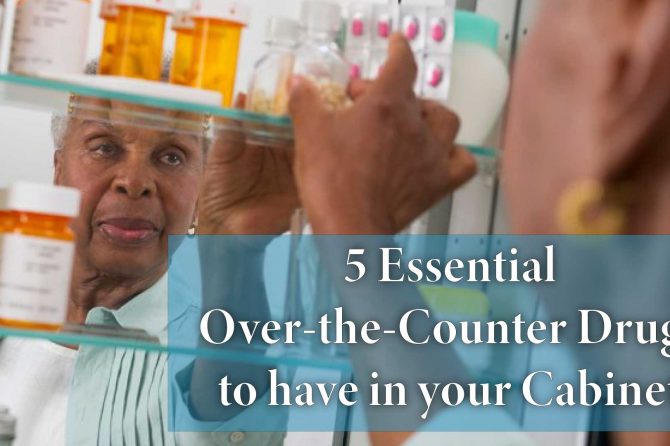
5 Essential Prescriptions to Keep in Your Medicinal Cabinet
With aging come more ailments, aches and pains. But a fully prepared stocked medicine cabinet can help ease occasional pains at old age. Before filling your stash, talk to your doctor and/or pharmacist about the medications you should take and any potential drug interactions that could be harmful.
Below is a list of what you should and shouldn’t include, plus some additional advice from the experts:
1. Pain relievers
When it comes to pain relief with older patients, it is recommended to start with acetaminophen or something similar to Tylenol. That’s because non-steroidal anti-inflammatory drugs (NSAIDs) — which include ibuprofen (Advil) and naproxen (Aleve) — can raise bleeding risks in the gastrointestinal tract, and this risk increases with age.
That said, acetaminophen isn’t risk-free. Taking too much can lead to severe liver damage. And just like other medications, there are a lot of drug interactions that could potentially exist with acetaminophen, too, so it is better to ask a professional before taking.
2. Heartburn helpers
For the occasional heartburn, a chewable calcium carbonate (Tums, Rolaids) is safe and can give you some quick relief. There are also some over-the-counter pills that can ease discomfort, including famotidine (Pepcid).
3. Allergy alleviators
Older adults — especially those in their 70s, 80s and 90s — should steer clear of diphenhydramine (Benadryl) because of its side effects which can increase risk for falls, cause dry mouth and lead to urinary incontinence. Long-term use has also been linked to an increased risk of dementia. Safer options include cetirizine (Zyrtec) and loratadine (Claritin).
4. Cold and cough
In this category, you may want to look elsewhere besides the medicinal cabinet for a solution. It is recommended with a light cold/cough that hot tea with honey or even ice water helps to relieve symptoms. If you feel like you need something stronger, look for a single-ingredient medicine so that you are not accidentally taking something that might have higher risk.
5. First-aid fixes
Adhesive bandages, gauze, antibiotic ointment, calamine lotion, hydrocortisone cream are all good things to have on hand for cuts, scrapes and run-ins with bugs and poison ivy. If you have thin or sensitive skin, you may want to consider sensitive-skin bandages. These are typically made of silicone or a less-sticky material.
Leave a reply